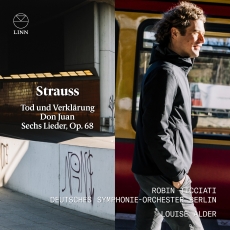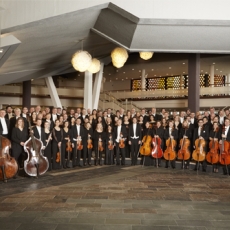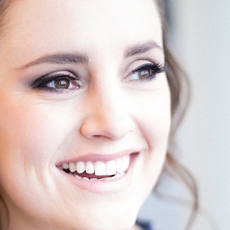Robin Ticciati, DSO Berlin & Louise Alder - Strauss - American Record Guide
Ticciati, who is still in his 30s, had his first major position with the Scottish Chamber Orchestra from 2009 to 2018; he added on the Directorship of the Glyndebourne Festival in 2014 and the German Symphony Berlin in 2017. Here he tackles two of the most popular Strauss tone poems along with a seldom-heard set of songs, the Brentano lieder, Op. 68. Don Juan, which premiered in 1889, was far from Strauss’s first work—it is Op. 20—but it is the one that put the composer, then just 24, on the map as a leader of the New German School. It combined orchestral virtuosity and melodic lyricism in a new and wonderful way, setting the stage for Strauss’s long career. Ticciati plays the opening, which some have likened to the popping of a champagne cork, with great panache, by which I mean it’s a sweeping gesture that you couldn’t transcribe if your life depended on it. The lyrical sections, though, are quite broad, so the overall time is more in Furtwängler territory (18 minutes) than Klemperer (17) or Kempe (16). Death and Transfiguration is similar in that the total time is a trifle slow (24 minutes), and the pacing is similar to Furtwängler’s back in 1950 (VPO). The big climactic sections (roughly letter G up to L, leading to the G major section and Q up to the big A-flat statement of the transfiguration theme) are effective and exciting. In short a fine job on both tone poems. Strauss wrote lieder all his life, but most of them (and many of our favorites) are early, before about 1906; many of them were written for his wife, Pauline de Ahna. The Brentano songs are later (1918), but they are a superb set, challenging for the singer and quite varied; they were orchestrated later, in 1933 and 1940. The fifth (`Amor’) requires a Zerbinetta voice, light and agile. `Lied der Frauen’, which describes women in fear of losing their husbands, is an 8-minute piece, intense and dramatic. Soprano Louise Alder has full measure of these songs. She is a lyric, with a voice suited to Pamina and Zerlina in Mozart, Sophie in Rosenkavalier. In a sense these songs are the high point of the program, because we have lots of good recordings of Don Juan and D&T, but the Brentano songs are seldom recorded. Texts and translations are included, along with informative liner notes.



